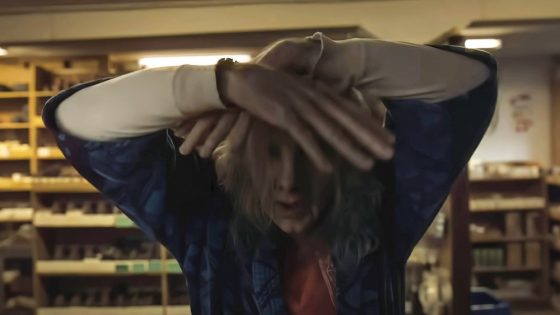Over the past few months, a twisted killer, a nonagenarian avenger and a talk show host with a deadly interest in the occult have reinvigorated an indie film business that had been in a prolonged slump. The success of movies like “Longlegs,” “Thelma” and “Late Night With the Devil” have helped a sector of the entertainment industry — crushed by COVID, strikes and streaming — mount a box office comeback. And while it’s a long way from the arthouse heyday of the 1990s and early aughts, the turnaround is impressive.
“We’ve had some of our biggest hits to date,” says Elissa Federoff, distribution chief at Neon, the studio behind the horror thriller “Long- legs.” “And that’s because we’ve taken bigger bets on bigger-budgeted films that have the potential to reach a much wider audience.”
Glen Basner, CEO of FilmNation, agrees that the picture has grown brighter, particularly when it comes to making new movies. “It feels like we’ve turned a corner,” he says. “Filming is ramping up again. There isn’t the same backlog of projects that needed to shoot all at once when the strike ended.”
As the Toronto International Film Festival kicks off this month, executives like Federoff and Basner will touch down in Canada with renewed optimism. They’re heading north to generate buzz for the movies they hope will be in the Oscar race, while also searching for the kinds of fare that can draw crowds. After all, TIFF is not only a showcase for completed films with distribution but also a place where studios can shop for movies and packages trying to find a home. Sales agents are also hoping that the good vibes permeating the business will make studios more willing to write big checks and spark some of the all-night bidding wars that have been absent for a while.
“People are feeling more confident,” says Sarah Lebutsch, acting senior VP of sales and distribution at Protagonist, which has four films debuting at TIFF. “And it seems like there are a healthy number of buyers traveling to Toronto.”
This year’s festival will host premieres and gala screenings for the likes of “The Piano Lesson,” an adaptation of August Wilson’s supernatural look at the legacy of slavery that Netflix hopes to turn into a best picture contender, as well as Neon’s “Anora,” a farce about a stripper and a Russian oligarch’s son that won the Palme d’Or at Cannes, and Focus Features’ “Conclave,” a Vatican-set thriller.
There will also be movies for sale that might end up filling the release slates of the indie distribu- tors. They include “Nutcrackers,” a family-friendly comedy from David Gordon Green and Ben Stiller; “Relay,” a thriller about corporate whistleblowers with Riz Ahmed and Lily James; and “The Deb,” a musical comedy about a debutante ball that marks Rebel Wilson’s feature directorial debut.
Sales agents and producers believe that things are finally getting back to normal, though it’s been a long journey to reestablish a sense of equilibrium. First, COVID shuttered cinemas for much of 2020 and brought the industry to a standstill. Then, just as theaters reopened and filming resumed, the actors and writers strikes shut down productions for the bulk of 2023. Last year, many of the executives and producers who boarded planes to the festivals were weighed down by dread — it seemed as if the disruptions of a pandemic and labor strife would prove cataclysmic.
“Independent filmmaking is challenging enough in the best of times, so when big, disruptive events happen, it really throws everything into disarray,” Lebutsch says.
This year, there’s still anxiety about where the business is headed and whether the box office rebound can be maintained, but it isn’t crippling.
Part of the reason for the renewed optimism is that the indie film business looks very different from the one that existed before the pandemic. In those days, historical dramas, documentaries and films from international auteurs dominated art-house cinema. Those films tended to be geared toward older audience members, who haven’t returned to theaters in the same numbers since the COVID shutdowns. That’s led some indie labels to reassess their strategies. They still focus on producing the adult-oriented films that major studios have rejected in favor of animated adventures and superhero franchises aimed at kids and teens. Yet, they’re ditching the corsets and cummerbunds that were synonymous with art-house cinema for something edgier, aimed at younger audiences. That means more thrillers, more horror films and more movies that defy easy categorization.
“The new specialty film is much more friendly to genre and youth,” says Scott Shooman, head of AMC Networks Film Group, which released the horror film “Late Night With the Devil.” “It’s less compartmentalized. You’re seeing things that are more political and unique. Films that may start off in a familiar place, but quickly move into some- thing that doesn’t necessarily fit neatly in a box.”
Still, ticket sales haven’t returned to their pre-pandemic levels, and there have been some notable indie failures, such as “I Saw the TV Glow,” “Lisa Frankenstein” and “Ezra.”
But the string of cost-effective films that have connected prove that this new approach to specialty content is starting to pay off. “Late Night With the Devil,” made for a pittance, nabbed $15.2 million globally. Meanwhile, “Thelma,” an action-comedy with 94-year-old June Squibb as a grandma in hot pursuit of phone scammers, earned $9.5 million worldwide, becoming the most successful narrative feature in the history of its distributor, Magnolia. Neon had an even bigger hit with “Long- legs,” which earned $100 million globally and is now the company’s highest-grossing release. A24, another indie player, also broke records as “Civil War,” a dystopian thriller that envisions America as a polarized hellscape, rode a wave of election-year interest to a $122.5 million global tally.
The way these movies hit theaters is also changing. In the past, most indies would open to a handful of screens and gradually expand their footprint over months, building word of mouth in the process. Now, many of these films are going wider much faster, launching on hundreds, even thousands, of screens. That allows them to get in front of more people, but it also comes with much higher costs — companies can spend more than $10 million to release a film across that many theaters, requiring more upfront cash. Not everyone is happy about the new landscape.
Tom Bernard, co-founder of Sony Pictures Classics, the distributor of Oscar winners such as “Call Me by Your Name” and “The Father,” says the new business model requires ceding too much control to chains such as AMC and Regal, which operate the majority of theaters.
“You get to go out into the world much faster, but they only play the movies for a couple of weeks,” he says. “Then they want to cycle in something different. So you get to $1 million or $2 million [at the box office] more quickly, but then you’re done theatrically.”
Releasing a film on more screens also means a film must have some hook — a hot star, an irresist- ible premise — to get people to pay attention and to justify the added expense. If a movie doesn’t work, a wide release won’t just be painful — it could be ruinous. But for films like “Longlegs” or “Civil War,” which tap into the zeitgeist, the payoff is immense.
“There is more risk, but with that comes the opportunity for even greater reward,” says Federoff.
Source Agencies



